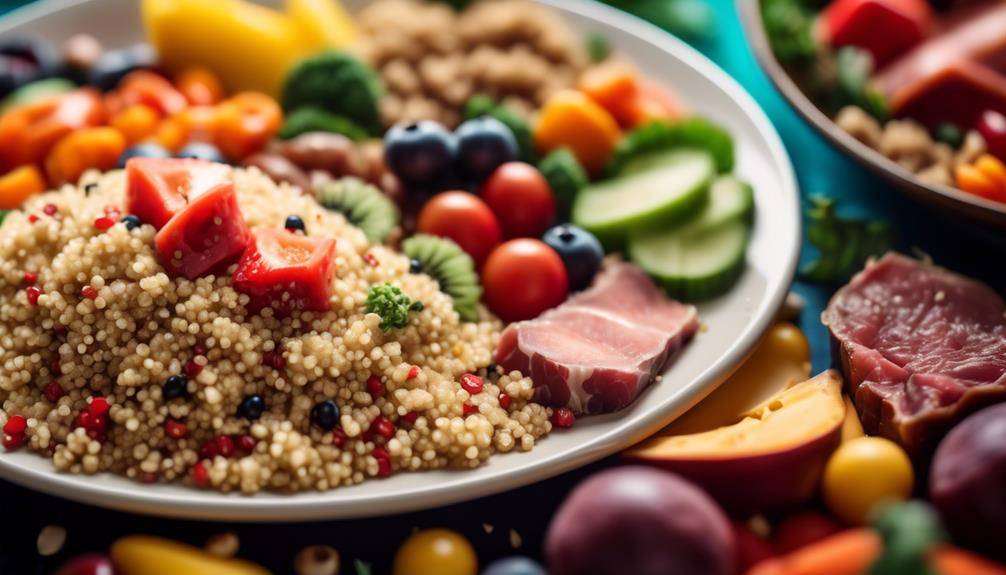Important Benefits of Ketogenic Diet Principles for Cancer Patients

Ketogenic Diet Principles for Cancer Patients; Did you know that the ketogenic diet, known for its low-carb, high-fat approach, has been gaining attention as a potential therapeutic strategy for cancer patients? While the idea of using a specialized diet to combat cancer may seem unconventional, research suggests that the principles behind the ketogenic diet may hold promise in supporting cancer treatment. So, how exactly does this diet work, and what are the potential benefits it may offer to those battling cancer? Let’s explore this fascinating topic further and uncover the principles of the ketogenic diet that could potentially make a difference in the lives of cancer patients.
Understanding the Ketogenic Diet
To understand the ketogenic diet, you need to grasp the fundamental principles behind this low-carbohydrate, high-fat eating plan that has gained attention for its potential benefits in managing cancer. The ketogenic diet research has shown that by drastically reducing carbohydrates and increasing the intake of healthy fats, the body enters a state of ketosis, where it primarily burns fat for fuel instead of glucose. This metabolic shift has been found to have several potential benefits for cancer patients.
Firstly, the ketogenic diet alters the metabolism in a way that may inhibit the growth of cancer cells. Cancer cells rely heavily on glucose for energy, and by restricting their main fuel source, the ketogenic diet may starve these cells, potentially slowing down their growth and spread. Additionally, the high fat content of the diet provides an alternative energy source for healthy cells, allowing them to continue functioning optimally.
Furthermore, the ketogenic diet has been found to improve the efficacy of certain cancer treatments. Research has shown that the metabolic changes induced by the diet can enhance the effects of chemotherapy and radiation therapy, making them more effective in targeting and killing cancer cells. This combination therapy approach has shown promise in increasing treatment outcomes and improving overall patient survival rates.
It is important to note that the ketogenic diet should be implemented under the guidance of a healthcare professional, as it may have potential side effects and interactions with certain medications. Additionally, individualized ketogenic diets may be necessary, as the optimal macronutrient ratios can vary depending on factors such as the type and stage of cancer, as well as the patient’s overall health.
Potential Benefits for Cancer Patients
The ketogenic diet has shown potential benefits for cancer patients in reducing tumor growth and enhancing treatment response. By restricting carbohydrates and increasing fat intake, the ketogenic diet helps to starve cancer cells of their preferred fuel source, glucose, thereby inhibiting their growth. Additionally, this diet has been found to enhance the effectiveness of conventional cancer treatments, such as chemotherapy and radiation therapy, potentially improving overall patient outcomes.
Reduced Tumor Growth
Reduced tumor growth can be a potential benefit for cancer patients following a ketogenic diet. Studies have shown that a ketogenic diet may help in reducing inflammation, which is a crucial factor in tumor growth. The metabolic changes induced by the diet, such as the shift from glucose to ketones as the primary fuel source, can also contribute to inhibiting tumor growth.
Cancer cells heavily rely on glucose for energy, and the restricted carbohydrate intake in a ketogenic diet deprives these cells of their preferred fuel source. Furthermore, ketones have been found to have anti-tumor effects, potentially slowing down the growth of cancer cells. While more research is needed to fully understand the mechanisms behind these effects, adopting a ketogenic diet may be a worthwhile strategy for cancer patients looking to reduce tumor growth.
Enhanced Treatment Response
By following a ketogenic diet, cancer patients may potentially experience enhanced treatment response, leading to improved outcomes in their battle against the disease. Research suggests that a ketogenic diet, which is low in carbohydrates and high in healthy fats, may have several mechanisms that can contribute to improving prognosis and supportive care for cancer patients.
Firstly, the ketogenic diet has been shown to enhance the effectiveness of certain cancer treatments, such as chemotherapy and radiation therapy. Studies have demonstrated that cancer cells rely heavily on glucose for energy, and by restricting carbohydrate intake, the ketogenic diet can starve cancer cells, making them more vulnerable to treatment.
Additionally, the ketogenic diet has been found to reduce inflammation and oxidative stress in the body, both of which play a role in cancer development and progression. By reducing these factors, the diet may help to support the body’s natural defense mechanisms and enhance the efficacy of cancer treatments.
Furthermore, the ketogenic diet has been shown to improve insulin sensitivity and regulate blood sugar levels. This is important because cancer cells often have insulin receptors that allow them to take up glucose more readily. By maintaining stable blood sugar levels, the ketogenic diet may help to deprive cancer cells of their preferred fuel source and enhance the effectiveness of treatment.
Implementing the Ketogenic Diet
Now that you understand the potential benefits of the ketogenic diet for cancer patients, it’s time to discuss how to implement this dietary approach. When it comes to meal planning, it’s important to focus on high-fat, moderate-protein, and low-carbohydrate foods. Essential food choices include healthy fats like avocados and coconut oil, as well as sources of quality protein such as fish and poultry. However, it’s crucial to be aware of potential side effects, such as the keto flu, and take steps to mitigate them.
Meal Planning Tips
To effectively implement the ketogenic diet, it is important to plan your meals in a way that aligns with the principles of this low-carbohydrate, high-fat eating approach. When it comes to meal planning strategies for the ketogenic diet, it is crucial to focus on meeting your nutritional needs while keeping your carbohydrate intake to a minimum.
Start by selecting foods that are high in healthy fats, such as avocados, nuts, and olive oil. Incorporate moderate amounts of protein from sources like eggs, fish, and poultry. Vegetables low in carbohydrates, such as leafy greens and cruciferous vegetables, should also be included in your meals. Additionally, it is essential to track your macronutrient intake and adjust your portion sizes accordingly to ensure you are maintaining the desired balance of fats, proteins, and carbohydrates. By carefully planning your meals, you can successfully adhere to the ketogenic diet and support your health goals.
Essential Food Choices
When implementing the ketogenic diet, make essential food choices that prioritize high-quality fats, moderate protein, and low-carbohydrate vegetables. These food options are crucial in maintaining the state of ketosis, where your body uses fat as its primary source of energy. High-quality fats like avocado, olive oil, and coconut oil are excellent choices. These fats provide necessary nutrients and promote satiety. Moderate protein intake is essential for muscle maintenance and repair.
Opt for grass-fed meat, wild-caught fish, and organic poultry. To keep carbohydrates low, focus on non-starchy vegetables such as leafy greens, broccoli, cauliflower, and zucchini. These dietary guidelines will help you achieve and maintain ketosis, supporting the therapeutic effects of the ketogenic diet in cancer patients. Remember to consult with your healthcare team for personalized recommendations.
Potential Side Effects
Implementing the ketogenic diet may potentially result in certain side effects that individuals should be aware of. While the diet has shown promise in managing symptoms and improving outcomes in cancer patients, it is crucial to understand the potential risks. One common side effect is the “keto flu,” which includes symptoms such as fatigue, headache, and nausea, typically occurring during the initial phase of the diet. These symptoms can be managed by staying hydrated and ensuring adequate electrolyte intake.
Additionally, the long-term effects of the ketogenic diet are still not well understood, especially in cancer patients. It is important to consult with a healthcare professional to ensure that the diet is suitable for individual needs and to monitor any potential side effects that may arise.
Important Considerations for Cancer Patients
Cancer patients must prioritize certain considerations when following a ketogenic diet. These considerations are crucial for ensuring that the diet is safe and effective in supporting their overall health and well-being. Here are three important things to keep in mind:
- Nutrition guidance: It is essential for cancer patients to consult with a registered dietitian or a healthcare professional who specializes in oncology nutrition. They can provide personalized nutrition guidance based on the patient’s specific needs, medical history, and treatment plan. A dietitian can help create a well-balanced ketogenic diet that meets the patient’s nutritional requirements while managing any dietary restrictions or limitations.
- Dietary restrictions: Cancer patients often have specific dietary restrictions due to their treatment or underlying medical conditions. These restrictions may include limitations on certain food groups, such as carbohydrates or certain types of fats. It is important to work closely with a healthcare professional to ensure that the ketogenic diet aligns with the patient’s dietary restrictions and doesn’t interfere with their treatment or recovery process.
- Monitoring and supervision: Regular monitoring and supervision are crucial when following a ketogenic diet as a cancer patient. This can help ensure that the diet is being followed correctly, and any potential side effects or complications can be addressed promptly. Close monitoring can also help track the patient’s progress and make necessary adjustments to the diet plan if needed.
Practical Tips for Success
To ensure success in following a ketogenic diet as a cancer patient, it is important to implement practical tips that can help you navigate the diet effectively and support your overall health and well-being. Making certain lifestyle changes and focusing on meal preparation can greatly contribute to your success.
Firstly, meal preparation is key. Planning and preparing your meals in advance can save you time and energy throughout the week. Consider batch cooking and freezing individual portions for easy access to healthy keto-friendly options. This way, you can ensure that you always have a nutritious meal on hand, even during busy or challenging times.
Additionally, it is crucial to make lifestyle changes that support your ketogenic diet. This includes avoiding processed foods, sugary drinks, and snacks. Instead, focus on consuming whole, nutrient-dense foods such as lean proteins, healthy fats, and low-carbohydrate vegetables. Incorporating regular physical activity into your routine can also enhance the benefits of the ketogenic diet.
Furthermore, staying hydrated is essential. Make sure to drink plenty of water throughout the day to support your body’s functions and promote overall well-being. It may also be beneficial to consult with a registered dietitian or nutritionist who specializes in the ketogenic diet for cancer patients. They can provide personalized guidance and support to help you navigate the diet successfully.
Monitoring and Adjusting the Diet
One important aspect of successfully following a ketogenic diet as a cancer patient is regularly monitoring and adjusting your diet. This allows you to optimize your nutrient intake and ensure that you are in a state of ketosis, which is crucial for the therapeutic benefits of the diet. Here are three key steps to help you effectively monitor and adjust your diet:
- Adjusting Macros: As you progress on the ketogenic diet, it is important to periodically reassess your macronutrient ratios. The typical macronutrient distribution for a ketogenic diet is high fat (70-80% of calories), moderate protein (20-25% of calories), and low carbohydrate (5-10% of calories). However, individual needs may vary depending on factors such as body composition, activity level, and response to the diet. Adjusting your macros may involve increasing or decreasing the proportion of fats, proteins, and carbohydrates to better suit your specific needs.
- Tracking Progress: Keeping track of your progress is essential for monitoring the effectiveness of the diet and making necessary adjustments. This can be done through various methods such as tracking your daily food intake, monitoring your ketone levels using urine, blood, or breath tests, and regularly assessing your weight, body measurements, and overall well-being. By tracking your progress, you can identify any areas that need improvement and make adjustments accordingly.
- Seeking Professional Guidance: It is highly recommended to consult with a healthcare professional or a registered dietitian who specializes in ketogenic diets for cancer patients. They can provide personalized guidance, help you interpret your progress, and make appropriate adjustments to your diet plan. They may also recommend additional monitoring tools or tests to ensure that you are safely and effectively following the diet.
Integrating the Ketogenic Diet Into Cancer Management
Integrating the ketogenic diet into cancer management can provide a valuable adjunctive therapy that supports overall treatment goals and promotes metabolic health. Meal preparation and nutritional support play crucial roles in successfully implementing the ketogenic diet for cancer patients.
When it comes to meal preparation, it is important to focus on high-quality, nutrient-dense foods. This means incorporating plenty of non-starchy vegetables, healthy fats, and moderate amounts of protein. It is also essential to choose organic and grass-fed options whenever possible to minimize exposure to toxins and maximize nutrient content.
To ensure adequate nutritional support, it may be helpful to consult with a registered dietitian who specializes in oncology nutrition. They can provide personalized guidance and help create meal plans that meet the individual needs and preferences of cancer patients. Additionally, they can monitor nutrient intake and make adjustments as needed, ensuring that patients are getting the necessary nutrients while maintaining a ketogenic state.
Incorporating the ketogenic diet into cancer management requires careful planning and monitoring. It is important to work closely with a healthcare team to ensure that the diet is being implemented safely and effectively. Regular follow-up visits and assessments can help identify any potential nutrient deficiencies or side effects and allow for necessary adjustments.
Integrating the ketogenic diet into cancer management can be a powerful tool in supporting treatment goals and improving metabolic health. By focusing on proper meal preparation and nutritional support, cancer patients can optimize the benefits of the ketogenic diet and enhance their overall well-being.
Ketogenic Diet Principles for Cancer Patients;Frequently Asked Questions
How Does the Ketogenic Diet Affect Cancer Cells and Their Growth?
The ketogenic diet can affect cancer cells and their growth by altering their metabolism. This diet restricts carbohydrate intake, forcing the body to use fat for energy instead. Some studies suggest that this shift in metabolism may inhibit tumor growth.
Are There Any Specific Foods or Ingredients That Should Be Completely Avoided on the Ketogenic Diet for Cancer Patients?
On the ketogenic diet for cancer patients, you should avoid foods high in sugars and grains. This is because these foods can negatively impact insulin sensitivity and promote inflammation, which may hinder the benefits of the diet.
Can the Ketogenic Diet Be Used as a Standalone Treatment for Cancer, or Should It Be Used in Combination With Other Therapies?
The ketogenic diet can be used as a standalone treatment for cancer, but it is often more effective when used in combination with other therapies. It’s important to consult with your healthcare team to determine the best approach for your specific situation.
Are There Any Potential Side Effects or Risks Associated With Following a Ketogenic Diet for Cancer Patients?
There are potential risks and long term effects associated with following a ketogenic diet for cancer patients. It is important to consider these factors and consult with a healthcare professional before starting this diet.
Can the Ketogenic Diet Help Prevent Cancer From Recurring or Spreading?
The ketogenic diet has been studied for its potential role in preventing cancer recurrence and spreading. Research suggests that the diet’s low carbohydrate and high fat content may help inhibit cancer cell growth and reduce inflammation.
Conclusion
In conclusion, the ketogenic diet shows promise as a complementary approach for cancer patients. Its potential benefits include improved metabolic health, reduced inflammation, and enhanced response to conventional treatments. Implementing the diet requires careful consideration and monitoring, with the guidance of healthcare professionals. Practical tips, such as meal planning and adjusting macronutrient ratios, can help patients successfully adhere to the diet. Integrating the ketogenic diet into cancer management may provide additional support for patients on their journey towards better health.








